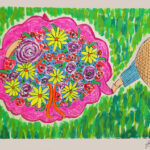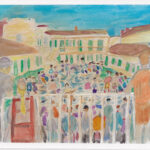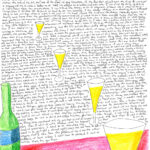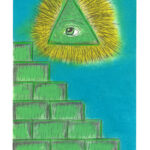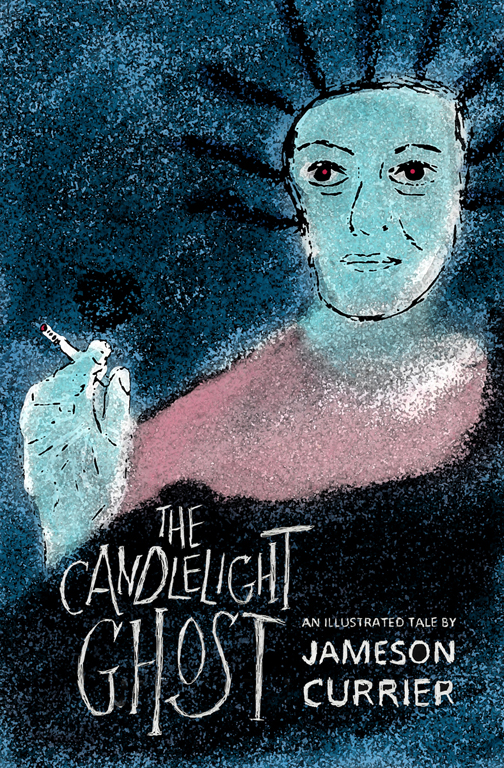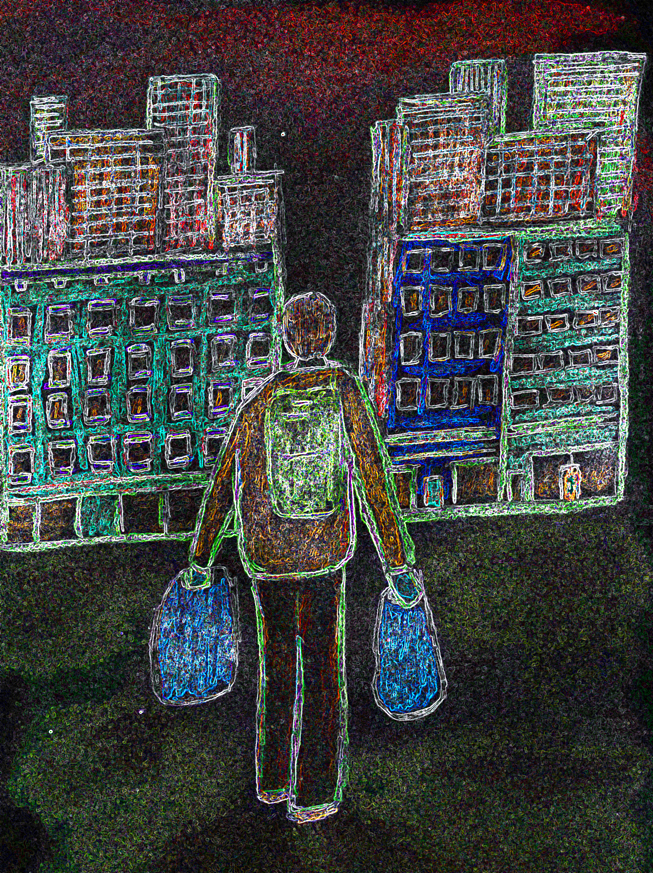
illustration by Jameson Currier
by Jameson Currier
John had carried the flowers since Perry Street, long-stemmed irises wrapped together by a pale-pink tissue. Now he held them across his lap in the taxi; a patch of his khaki pants had turned dark brown from the beads of water which rolled down the stems. Danny thought John would have tired of flowers; once a week he had carried irises to Adam. This afternoon, on their way to Seventh Avenue, John had hesitated in front of the florist, and Danny, recognizing the confused look which had rushed across John’s face, had instinctively scooped up the flowers from the white plastic bucket. Shifting the weight of the canvas gym bag he was carrying to his left shoulder, Danny went inside and paid a small Asian woman, watching her eyes disappear into fine lines as she smiled and wrapped the irises together. Outside again, on the sidewalk, John raised his arms toward Danny, taking the flowers as though offering to hold a child. In the taxi, Danny lifted John’s hand and smelled his wrist, wondering why the fragrance of flowers never lasted as long as cologne.
* * *
Adam had carried only his briefcase to the emergency room. Inside was his wallet, his address book, a bottle of aspirin, and the reviews of the play he had been publicizing. Adam had tried calling John first, but he was out of the office, so he called Danny, because he was worried and wanted help quickly. When Danny got to the hospital, Adam was already in a private room and had a temperature of 103. Danny took the keys to Adam’s apartment and brought back to the hospital Adam’s pajamas, bathrobe, slippers, razor, shaving cream, toothbrush, toothpaste, and pillow. By the time Danny returned, Adam was asleep and John was sitting in the chair beside the bed, watching the sun set through the windows that overlooked East Seventy-ninth Street.
The next day the doctors began their tests. Nurses drew blood and took away urine samples, though nothing was done specifically about the pain in Adam’s lower back, which was the reason he had gone to the emergency room in the first place, Adam told Danny. John had to ask the nurses several times about getting some sort of medication to relieve Adam’s discomfort, and finally got a doctor to order a prescription for Percodan. While Adam was being examined by yet another doctor, John and Danny sat in the waiting room, and John mentioned it wasn’t the pain that had driven Adam to the hospital. He had been working too hard, had been trying to cover for his boss, who was on vacation. The producers were worried because the play wasn’t a hit. Stress and exhaustion, John said, were the reasons Adam was here. Danny slumped down in his chair and rested his elbows against his knees, cupping his chin in the palms of his hands. Danny could tell Adam was thinner since last week; the youthful complexion had disappeared from his face, leaving behind an impression of bones and angles. Danny shifted his head till his eyes rested at a point somewhere beyond John. I wish I could believe that was the reason, Danny said. But I know it’s not. Don’t forget, I’ve been here before.
The following day John took off work and brought Adam flowers. Adam had not showered or shaved in three days. Lying in bed, he held the flowers across his chest and then asked John to help rearrange the pillows behind his neck. That night, Danny came by after work and brought the fruit salad that Adam had called and said he wanted, because, he added, he could not even stand to smell the hospital food. Danny had stopped at the Korean grocery on Lexington Avenue and bought a container of sliced peaches, melons, and strawberries, as out-of-season as the flowers John had found. John brought a bottle of orange soda Adam had called and asked for. While Adam ate, slowly and uncomfortably, John and Danny sat near the bed and watched Hollywood Squares on the wall-mounted television set. Before they left, Adam threw up the food, and John helped Adam change into a clean T-shirt, while Danny wiped the floor and rinsed the soiled pajamas. In the hall outside Adam’s room, John mentioned he was surprised Adam was getting worse. Don’t people go into the hospital to get better? he asked. Adam had been in the hospital only last month, overnight, for a blood transfusion. Danny said nothing but shifted his feet so he could lean against the wall for support. Danny knew Adam had already passed the point; the virus had become a disease.
Adam told John he didn’t want any visitors. Only John and Danny were allowed to come by. I don’t want anyone to see me like this, Adam said. They would be upset and hurt. Some would be angry, he explained to Danny. He would be better in a few days and then would go home. And Adam said no one could bring him anything personal other than clothing and toiletries, not even a book or a radio or a TV Guide, anything, he noted, which would suggest he might be in the hospital for a while. After all, he said, I’m not planning on staying here long, and then, lifting his eyes to the ceiling and assessing himself realistically, added, I just don’t want it to feel like a long time. In four days, Adam had dropped five pounds. He hated the hospital. He thought the nurses were inept; they couldn’t even tell the difference between aspirin and Valium. They won’t help me, he said. They can’t stop the pain in my back.
And the doctors continued their tests: X rays of his chest, abdomen, and skull. There were bone scans, T scans, CAT scans, spinal taps, and another blood transfusion. By the end of the week, when friends found out Adam had not been at work or at home, the phone beside his hospital bed began ringing, and Danny knew the visitors could not be stopped.
Wes brought a new pair of pajamas after John mentioned Adam had already thrown out three pairs and several hospital gowns. Cheryl, Adam’s assistant, brought a bag of Pepperidge Farm Goldfish crackers, which at the moment she spoke with Adam on the phone was what Adam wanted, though they remained unopened in the top drawer of the hospital dresser. Roy brought current copies of Spy and New York magazines; Elliot brought Archie and Superman comic books. They all tried to smile, joke, catch Adam up on what was happening at work or in the news. They would clear their throats, change the subject, or avert their eyes when necessary, carrying their feelings inside, the way they knew they must, the way they knew Adam wanted. In the evenings, John and Danny would bring whatever food Adam wanted: lemon yogurt, canned peaches, pretzels, or taco chips. Most nights Danny stayed later than visiting hours, in case Adam threw up and needed to be changed.
And the tests continued. Steve brought an advance copy of the book he was editing on the Bloomsbury authors. Elliot brought scissors, which Adam used to clip his nails. Bob brought lip balm, which Adam wanted because he thought the hospital air was so dry. When the new pajamas found their way into the trash, John went to a discount store and bought six irregular large T-shirts, though Adam’s favorite was the old gray shirt Danny pulled from his gym bag one night; Adam refused to wear it, instead keeping it rolled up next to his assortment of pillows. The office sent an arrangement of red and white columbines. Millie sent a basket of painted daisies. Roy brought yellow tulips. One night during the second week, Adam asked John to bring the bottle of cologne he kept underneath the towels in the closet of the apartment. If I’m not washing, he said, at least I can smell better than the flowers. When a postcard arrived at the hospital from London, from Harris, Adam spent an hour trying to calculate how long it had taken to arrive by overseas mail, how long he had been in the hospital, and what day Harris had heard he was sick.
Cheryl said to Danny she had never realized the small red bumps on Adam’s cheeks were Kaposi’s sarcoma; she had thought it was acne that wouldn’t go away. After all, she commented softly while Adam was sleeping, he’ll bring almost anything back to his desk to eat. Although I do, too, she moaned, but he never had to worry about his weight. Later that week, Adam told John food had lost its taste. It only has a meaning now, he said, and the next day he stopped eating altogether. The nurses began feeding him with a machine suspended on a pole which pumped solutions of fats and minerals and vitamins through plastic tubes connected to a vein in his right arm. Adam seldom moved from the bed now. When he couldn’t manage to push the pump to the bathroom, the nurses brought urinals and bedpans but were still sluggish about bringing him medication. John began to have problems coping with Adam’s illness. So Danny began to wash Adam at night with warm, wet cloths and brought cups and pans of water from the sink so he could brush his teeth. Adam said he still had the pain in his lower back and the doctors could not find the cause. It’s not even a brain tumor, Adam remarked during a commercial between rounds of Jeopardy. He turned his head away from the TV set and began to cry. All I want to do is go out and see a movie, he said. At a theatre. With real popcorn and butter. The next day Adam had a biopsy of the lymph glands of his neck. Two days later a doctor brought the news he had Burkitt’s lymphoma. Danny made Adam call his mother in New Jersey and tell her he was sick. She’s the only family you have, and you have to tell her, Danny said. It’s not right to keep it a secret any longer. On Saturday, his mother came to the hospital, stayed two hours, and cried. On Monday, Adam began chemotherapy. Adam told Danny he was honestly going to get better. Because now he was ready to go back home.
Danny was surprised three weeks had passed. Many days he could not find an order or sense of strategy to what had to be done, so he began to make lists: what to carry to the hospital, what he had to buy, whom he had to call, what he had to do when he got home. Danny carried the lists in his gym bag, pressed between the pages of his calendar. Inside, along with a bottle of ibuprofen, Danny carried antihistamine pills, decongestant tablets, and a box of cherry-flavored cough drops, because he never knew if the headaches he got in the late afternoons might actually be the start of the flu or a cold. There was also a comb, two ballpoint pens, a small scratch pad that Danny used to jot down notes, and a combination lock for his gym locker, though Danny had not made it to the gym since Adam first entered the hospital. Some days Danny worried the canvas bag would rip; when he added a book to read on the subway, and an umbrella or gloves because the weather could slip without warning between fall and winter, the weight would almost reach ten pounds.
The day Adam came home, John and Danny carried everything in duffel bags from the hospital to the fourth-floor apartment. Adam had been released and set up on a home-care program. A nurse would visit if needed; every night he would continue the intravenous fluids. Two delivery men from the home-care service carried up the stairs an infusion pump similar to the one that had stood next to the hospital bed, and three large boxes of supplies. Inside were vitamin, lipid, and insulin bottles, and an assortment of needles, syringes, and plastic tubing. Enough supplies for a month, a hospital representative told Danny. Danny cleaned the refrigerator to make room for the plastic bags of nutritional solution which Adam had to have for twelve hours each night. In his gym bag Danny now carried a change of clothing, in case he slept overnight at Adam’s apartment; in his calendar he wrote every possible emergency number he might have to use. John made five extra sets of keys to the apartment, one for Danny, one for himself, others for Roy, Wes, and Elliot, so they could come and go as quickly and easily as necessary. Elliot went to the grocery store to get the things Adam wanted to eat: frozen turkey tetrazzini and pizza, potato chips, mocha-nut ice cream, milk, and mint-chocolate-chip cookies. Roy went to the pharmacy to get the medicine the doctor had prescribed: Halcion for sleep, Xanax for anxiety, Nizoral for thrush, Zovirax for the herpes sores in Adam’s mouth, and prednisone, Bactrim, allopurinol, and AZT. Adam complained about taking so many pills. His least favorite were the large yellow capsules, which he said were difficult to swallow. His voice sounds so strange now, Danny said to John when they were alone in the kitchen. It sounds as raspy as if he’d spent a lifetime smoking, and he’s always coughing to clear away the phlegm.
That night, John and Danny helped Adam hook up the infusion pump, following the instructions a nurse had written for them. Before he left the hospital, Adam had had surgery to implant a catheter in his chest, because his arms had turned into long strands of bruises where the veins had collapsed from being punctured with too many needles. It took John and Danny over two hours to do what the nurse had demonstrated in less than twenty minutes. They injected insulin and liquid vitamins into the clear solution of a plastic bag, connected plastic tubing to the bag and a bottle of lipids, and then suspended them from the poles of the infusion pump. They washed their hands and ran the tubing through the machine, then wiped the end with gauzes soaked in isopropyl and povidone-iodine. John panicked at every step, convinced Adam would be murdered by an air bubble. Danny continued, steadying his hands by placing his arms on Adam’s stomach till he had connected the liquid-filled tubing to the tubing that hung from Adam’s chest. Adam, too, was anxious and nervous. I don’t want to go back, he said, and could not fall asleep. He refused to take the Halcion or Xanax and stayed awake, sweating and worrying and rolling the pump to the bathroom because of his diarrhea.
The first week Adam spent at home, everyone carried the hope he was getting better. Roy picked up Adam’s paychecks and did the best he could to sort through what bills could be sent to the insurance company. Cheryl carried more insurance forms to the apartment. John did more grocery shopping; there never seemed to be enough paper towels, tissues, or garbage bags. Bob came by and trimmed Adam’s hair. Elliot did the laundry. Wes took afternoons off from work to take Adam to the doctor’s office for chemotherapy treatments. Danny arranged a meal service to deliver lunches to Adam in the afternoon. In the evenings, friends brought him dinner. Steve brought Chinese, Millie brought Italian, Bob brought cream of broccoli soup and an omelet from the restaurant where he worked. Adam said there was more food than he would ever eat, even if he did have an appetite.
When Danny arrived in the evenings now, he hung a change of clothing in the bedroom closet. His overnight kit, which contained soap, shampoo, deodorant, shaving cream, and a razor, found a permanent place by the bathroom windowsill. Danny slept on the floor beside Adam’s bed; he was afraid of sleeping in the bed with Adam, because he was certain he would become tangled in the plastic tubes. Adam has always been a restless sleeper, John said. Before he became sick, he would toss so violently he would twist the sheet around himself till he cut off his circulation. When Adam could no longer make it to the bathroom in the middle of the night, even with help, Danny bought a bed pan, and John found the large plastic Donald Duck glasses to use as urinals, the ones Adam had brought back from his trip to Disney World.
Adam said afternoons were always the worst. He would be alone in the apartment, watching TV, when the depression would hit. But if anyone called, he refused to answer the phone, afraid of having someone hear the way his voice sounded. There were moments when Danny actually thought Adam was getting better. At least his spirits seemed to rise. At least he was eating. Every evening Adam would describe for Danny what he had eaten, how many bites he had taken, and if it tasted good or bad. Adam had also started coughing in his sleep, so fitfully Danny thought he wasn’t sleeping well; Danny was surprised, then, when he asked Adam one morning how he had slept and Adam answered, I’m sleeping better than ever.
Danny learned Adam’s thoughts went through a cycle. One day it was, Am I going to die? Another, it would be, Do you think I’m going to die? Danny was never sure how to answer Adam’s questions. Once, when Danny decided to be honest and Adam asked, How do I look?, Danny responded by saying, Okay. Adam lifted himself out of bed and walked to the mirror that hung on the back of the bedroom door, bracing himself by holding on to the doorknob. Just okay? he questioned, and began brushing his thinning hair. Please, he added, I still have my vanity, and he walked to the window and threw the brush outside.
The second week he was home, Roy and Danny took Adam to see a movie. Danny helped Adam walk down the four flights of stairs, his arms wrapped around Adam’s waist so he would not fall because Adam refused to use the cane John had bought. Roy borrowed a car and dropped them off in front of the theatre on Fifty-ninth Street. Danny found it difficult to concentrate on the movie, even though Adam felt certain it would be nominated for a number of Academy Awards. Roy bought popcorn and sodas, though Adam ate nothing, coughing and squirming in his seat the entire two hours. Afterward, riding in the car back to the apartment, Adam said he wanted to get tickets to see The Phantom of the Opera and take a cruise to the Bahamas in the spring. When Roy and Danny were alone in Adam’s kitchen, Roy said Adam was setting himself up for disappointments. Danny replied, It’s the way Adam has always lived. He needs to look forward to something. Later, in the bedroom, Adam told Danny, Today was the first time I was actually afraid of dying.
Danny was concerned that Adam was telling him things he told no one else. When Roy or John or Wes or Elliot was out of the room, Adam would talk about how he had not had sex since July because of the pain in his back. Adam said he felt safe when Danny slept on the floor, though he knew it was selfish to ask so much of him, but John was too inpatient, Roy flustered easily, and they never knew what to do if there was a problem. Once, Adam said to Danny, I’m so afraid you’ll be so disgusted you’ll walk away. Danny promised him he wouldn’t leave, though Danny knew there were moments when he wished Adam would die quickly. Adam himself could be impatient: Danny was too slow bringing the medication or could not pick up the tissues fast enough from the floor. The glass of water was too cloudy or cold, the TV was not loud enough or too loud, or Danny had left his fingerprints on the lens after cleaning Adam’s eyeglasses. Adam had now dropped six more pounds; at night, he would stretch out his arms and remark in a rather wry tone, I’m beginning to look worse than a Biafra baby.
On Wednesday, Wes invited friends over to watch The Wizard of Oz on TV. Roy decorated the living room with a rainbow of crepe paper. Cheryl made green cookies to eat when Dorothy reached the Emerald City. Danny carried Adam to the couch in the living room a few minutes before the movie was to start. John remarked it was odd it wasn’t Sunday. Remember, Bob added, it was always telecast on Sunday nights. Elliot said when he was a kid his parents always made sure they stayed late at church that night just to torture him. Adam said the worst punishment his mother ever gave him was not letting him watch it one year. He cried so hard she finally relented, letting him out of his bedroom just as the Wicked Witch disappeared in a puff of smoke on top of the thatched roof. Steve said, Remember when we watched it all in black and white? Or when we had to go to someone’s house to watch it in color, John added. Roy said his favorite was still Peter Pan. Remember when Mary Martin sang about Never-Never Land?
The next morning Adam said to Danny, We can’t go on like this, and laughed weakly. How many men have said that to you in your lifetime? Still trying to shake the sleep from his body, Danny sat on the side of the bed and held Adam’s hand. I should go back to the hospital, Adam said. This isn’t fair to anyone.
The moment Adam said he felt better was the time he was the most helpless, strapped in a wheelchair whizzing through a hospital corridor. It was almost fun, he told Danny later, all dressed in white, letting people I didn’t even know worry about only me for just a few minutes.
The doctors began more tests: EKGs, EEGs, X rays, specimens, and cultures. The reason he went back, Adam said, was because he needed stronger chemotherapy, and he wasn’t able to function at home alone the day after the dosages. He got angry only once, when a nurse said he wasn’t trying hard enough when he refused to take a pill right away. He yelled back at her that she wasn’t his mother. In fact, he added, I don’t even like you, and besides, I didn’t even ask for your opinion. The next day the stitching that held the catheter tubing in place fell apart. The doctor said it was impossible to perform the surgery again to repair it. Adam was too weak; now he weighed a hundred pounds. And an X ray showed a small black spot on his right lung. Another doctor said Adam wouldn’t be able to sustain the amount of chemotherapy he would need. By the end of the night, the nurses had set him up on a respiratory system; oxygen rushed through plastic tubing to his nose. The next morning, Danny arranged for twenty-four-hour nursing care so Adam could go home. Adam had decided it was time to die.
It’s not like I’m giving up, he said to Danny and John and Roy. It’s just that I’m going to die naturally, without surgery or therapy or treatments which would only prolong my life by a couple of days.
This time, John and Danny carried Adam up the stairs in a wheelchair. Roy went and picked up more prescriptions: Duricef, Compazine, nystatin, propranolol, and dexamethasone. A nurse was always there to give Adam his medication and make sure he would eat. Danny told John he felt somewhat relieved. Now there is someone who knows what to do about the coughing, knows when he needs to drink liquids, knows what time he is supposed to take a pill, knows what to say and how to deal with the pain. Someone is there to help him be comfortable. John answered, It isn’t like this is all new to us.
Danny told John, Adam always had a fascination with suicide. Didn’t he remember Adam reading Last Wish by Betty Rollin? The first time he was in the hospital, Adam had asked if Danny could find someone who could get him Nembutal—his doctor had refused to give him a prescription. Adam mentioned suicide first to Danny because he knew it would upset John. Adam said that he wanted to live, but the quality of his life had deteriorated beyond depression. I’ve spent the last two months waiting, he said. Waiting for doctors and nurses and medicine and food and visits and friends. Roy cried when Danny told him Adam wanted to die swiftly and painlessly, but Danny knew that Adam would not kill himself, that Adam had carried himself with dignity for so long, he wouldn’t want his life to end with disappointments. Roy told Adam he didn’t want him to do it, but if that was his decision, then he would do his best to respect it. But no one would help Adam find the medication. Adam complained it had been easy in the book. When Adam asked Danny to just open the window and let him jump, Danny said no, and Adam said he would do it himself. Danny laughed and tried turning it into a joke: How could someone who has not moved from bed in over a week make it to the window and jump from the fire escape? I thought you were going to help me die, Adam replied. I’m sorry I’m disappointing you, Danny answered. Now you know exactly how selfish I am. I’m sorry you’re more valuable to me alive than dead.
Five days after coming home from the hospital, Adam died. In the afternoon he began to have respiratory problems. The nurse hooked him up to the oxygen tank which had been placed by his bed. By the time Danny arrived, around seven o’clock, Adam was semiconscious, lying on his back, gasping for breath, his arms twitching as if he were asking for help. Danny reached for Adam’s hand, thinking he might calm him, but he was shocked that Adam’s skin felt as cold and lifeless as vinyl, so Danny rubbed his hands along Adam’s arms, hoping it would help the circulation. Thirty minutes later, when the gasping subsided, the nurse rolled Adam over to rest on his side. She turned to Danny and said in a brisk whisper, Have any arrangements been made? Does he want last rites? Danny paced the floor till the breathing stopped.
The only time Danny cried was the day in the hospital when an orderly came into the room and shaved the hair on Adam’s chest before the surgery to implant the catheter. John cried after his first visit to the hospital. Roy said he had cried while waiting in line to buy underwear. Cheryl cried when Adam called and said she could have the posters that hung over his desk. Wes said he cried in the steam room at the gym, when he knew no one was looking. Bob and Millie cried while having drinks together at the bar of a Japanese restaurant in the Village after they had tried to get Adam to eat the dinner Millie had brought. Elliot cried during the opening credits when Auntie Mame came on TV one night; he and Adam had seen it together on a double bill at the Regency. Steve didn’t cry, or so he said, though Danny noticed he had started walking with his fists clenched.
In the hospital a doctor remarked to John that someone might carry this virus in his body for years before it began to deteriorate the immune system. Some people might not be affected at all. Danny turned to the doctor and replied rather sarcastically, Do you think we’re all fools? We all know about this disease. Don’t you know? Danny added. Haven’t you heard? It’s the fear every gay man carries today.
* * *
The hardest thing, Danny said to John during the ride in the taxi, was carrying the ashes. Danny had picked them up yesterday from the funeral home. They had been placed inside a cardboard box, small and rectangular, and the man at the funeral home had placed the box in a plastic bag. When Danny took the bag, he was surprised it was so heavy for something that small, estimating the weight he held was almost ten pounds. As Danny walked back to the apartment, the weight grew heavier; he couldn’t shake the thought of what he carried.
John took the flowers to the kitchen of Wes’s apartment, unwrapped them from the tissue, and arranged them in a tall glass vase. He carried them to the dining table and placed them at the center. Around him Roy, Millie, and Elliot took their seats. The extra leaf Wes had added to the table made the room seem smaller; the air was warm and perfumed by the ginger he had used in cooking. Bob dimmed the overhead light, Cheryl lit the candles with the matches she found in her purse, and Steve circled the table, pouring glasses of wine. Danny asked Wes if there was anything he could do to help: Give me something to do, Danny said. Bring these to the table, Wes answered, pointing at two steaming plates of food.
As Danny brought the plates from the kitchen he paused at the window, noticing the way the rain bent the branches of a tree toward the sidewalk. This afternoon Adam’s mother had called him. She had found the portrait which had been painted of Adam eight years ago, the summer when Adam was twenty-four. She described the picture, the way the artist had overlapped a sequence of pale-blue and green strokes, like a camera out of focus, yet had remarkably managed to capture the dimples on the left side of his mouth when Adam tried to hold back a smile. Then she apologized for not mentioning at the funeral that, when she saw Adam the day before he died, he had said, I feel so ashamed that it has to end this way. They’ve made it so much easier for me, and I’ve only made it harder for them. You know he loved you very much, she said to Danny. He wanted you to have the portrait. I’ll send it to you soon, she added, and then said goodbye.
Danny had done everything he knew how to do; why, then, did he feel that wasn’t enough? He straightened his shoulders to release the strain from his back and then carried the plates to the table.
__________
“What They Carried” first appeared in the author’s collection Dancing on the Moon: Short Stories About AIDS, published in hardcover by Viking in 1993 and in paperback by Penguin in 1994. An earlier version of this story was a finalist for the 1989 Nimrod/Katherine Anne Porter Award for Fiction. The story was also included in the anthology Making Literature Matter: An Anthology for Readers and Writers, edited by John Schilb and John Clifford (Bedford, 2000). This story was included in the author’s collection Still Dancing: New and Selected Stories, published in paperback by Lethe Press in 2008 and reprinted by Chelsea Station Editions in 2011.
